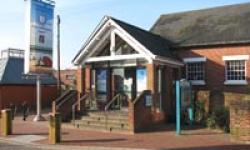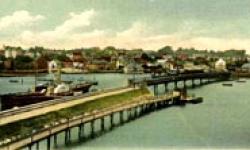Welcome to St Barbe Museum, Lymington, United Kingdom . St Barbe Museum explores the unique history of Lymington and the New Forest Coast. The colourful, hands-on displays provide a fascinating journey of discovery for all ages, charting Lymington's development as a market town and port and looking at the smugglers, salt makers and boat builders who have used the Solent shore. The art galleries host an exclusive programme of exhibitions that regularly include works on loan from national and regional collections.
St Barbe Museum is an independent organisation governed by Lymington Museum Trust, a registered charity (no.1018779). Since opening in its finished form in 1999, it has acquired a reputation as one of the finest Museums and art galleries in the region. The New Forest Coastal Story. Lymington's location by a river with easy access to the Solent and Isle of Wight has made it a favoured site for tens of thousands of years. Its many natural advantages resulted in it being granted a Charter around 1200 by the Earl of Devon.
The New Forest Coastal StoryWith the right to hold a weekly market and annual fair, Lymington became a focus for the surrounding farming communities at villages like Boldre and Sway. It grew into a successful trading town and port, using timber from the New Forest for its expanding boat building industry. The sheltered creeks of the coast provided for later industrial riches as one of the leading salt producing towns in the 1700s and early 1800s. During the same period smuggling became a huge unofficial industry along the Solent coast with many local people involved and some violent encounters between the smugglers and the customs men.
The New Forest Coastal Story Connections with the Isle of Wight have always been important and in recent years enabled Lymington to keep its railway branch line. The railways turned the village of Milton into the town of New Milton and brought tourists to Milford and Barton-on-Sea. In the 19th and 20th centuries, Lymington became known as a centre for yacht building and racing. Less prominent now is Lymington's engineering industry; the town was once home to the Wellworthy Piston Ring Company, a major supplier of engine components to the motor and aeronautical industries in the UK from the First World War to the 1980s.



St Barbe Museum reviews
Login to comment